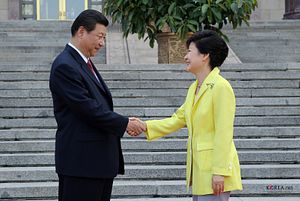It hasn’t been a good two weeks for China’s maritime claims. First, a U.S. freedom of navigation operation took the USS Lassen, a guided missile destroyer, within 12 nautical miles of a Chinese-controlled feature in the South China Sea, then the Permanent Court of Arbitration in The Hague ruled that it does have jurisdiction to hear the Philippines’ case against China’s South China Sea claims (despite objections from Beijing). But this week, there was some good news for China in the maritime domain: China and South Korea are inching toward finalizing the maritime demarcation between their two countries.
China and South Korea’s exclusive economic zones (EEZs) overlap in the Yellow Sea, and as of yet the two sides haven’t reached an agreement on the demarcation line. This has led to heightened tensions over fishing rights in particular, with clashes between the South Korean Coast Guard and Chinese fishermen accused of illegally fishing in South Korea’s waters. In 2014, a Chinese fisherman was fatally shot in a scuffle with the South Korean Coast Guard; in 2011, a Chinese fisherman fatally stabbed a South Korean Coast Guard officer. Finalizing the demarcation line would help prevent further ugly encounters between the two sides.
There’s no real territorial dispute at stake for China or South Korea, although they spar over a submerged rock (known as Ieodo in Korea and Suyan in China). Both sides agree the rock has no territorial status – and thus is not the subject of a territorial dispute – but both China and South Korea claim the rock is included in their respective EEZs. South Korea has built an ocean research station on Ieodo, while China made sure its 2013 air defense identification zone in the East China Sea extended over it. In response, South Korea expanded its own ADIZ to cover the rock.
The maritime demarcation issue has been regularly brought up at bilateral meetings, but this is the first time China and South Korea will conduct formal negotiations aimed at defining the demarcation line. When Chinese President Xi Jinping was in South Korea in July 2014, he and Korean President Park Geun-hye agreed that the two sides would start official discussions on the maritime demarcation line in 2015. The talks next month will come just in time to fulfill that promise.
South Korean Foreign Ministry deputy spokesperson Sun Nahm-kook told reporters on Thursday that “the two countries have been holding relevant discussions and are working to set the date of the first [maritime demarcation] meeting for some time in December 2015.”
On Friday, Chinese Foreign Ministry spokesperson Hua Chunying confirmed that “the two sides have agreed upon consultations to hold the first round of China-ROK maritime demarcation talks in December this year.”
“To fairly and properly demarcate the China-ROK maritime boundary through negotiations and consultations is of great significance to upholding tranquility and stability of the relevant waters,” Hua said. She added that the talks give “full expression to China’s long-standing stance and position to settle maritime disputes with its neighbors through bilateral dialogues on the basis of respecting historical facts and international law.”
“It is hoped that China and the ROK can fairly and properly resolve the overlapping claims of maritime rights and interests through amicable consultations and set a good example for regional countries in addressing similar issues,” Hua added.
Setting a “good example” cuts both ways for China. For one thing, by successfully negotiating a maritime demarcation with South Korea, Beijing can show it is capable of resolving maritime disputes peacefully and equitably through talks, thus bolstering its position when it comes to actual territorial disputes in the East and South China Sea. China can also demonstrate to other neighbors the “right” way of solving disputes through bilateral talks – as opposed to the Philippine approach of appealing to international law or the suggestion that ASEAN should handle the issues as a unit. With that in mind, Beijing might want to make sure South Korea comes out looking like a winner, in order to demonstrate that bilateral negotiations with China are both productive and profitable.
China’s ties with South Korea are at a high-point, smoothing the way for the maritime demarcation talks. Plus, both sides admit there are no actual territorial issues at play. If China is going to solve any of its maritime disputes through bilateral talks, the maritime demarcation with South Korea seems like its best bet.































